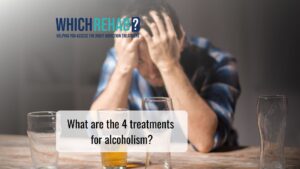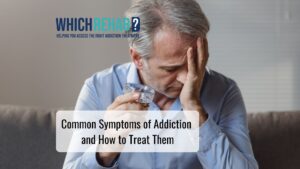Alcohol addiction is a chronic disease that can negatively impact mental health, relationships, and overall well-being. It’s well known that rehab is one of the safest and most reliable ways to overcome addiction, but what are the actual stages of alcohol rehab?
In this article, we will delve into the stages of alcohol rehab, discussing what happens during each stage, and why they are important for individuals struggling with alcohol addiction.
Understanding the stages of alcohol rehab and the recovery journey is crucial to achieving long-term sobriety and improving one’s quality of life.
Whether you or a loved one are considering rehab for the first time, or have been through the process before, this article will provide valuable information regarding the steps involved in alcohol rehab, the different forms of treatment available, and the tools needed to maintain a healthier and sober life.

What is Rehab?
Rehabilitation, commonly known as rehab, is a process of treating people who struggle with addiction, mental health disorders, or behavioural health conditions. The primary goal of rehab is to help you achieve sobriety, form healthy coping strategies, and lead a healthier life.
Rehab programs vary in duration, approach, and services offered, as well as the types of addictions and disorders treated. The journey to recovery may be uncomfortable, but it’s a step in the right direction towards regaining control over alcohol or drug consumption, addressing mental health issues, and preventing relapse.
In rehab, you can expect to go through different stages of recovery, including assessment, detoxification and therapy & counselling to develop relapse prevention strategies. Rehab options range from inpatient and outpatient programs to group meetings such as Alcoholics Anonymous and the use of medications to decrease alcohol cravings, among others.
At rehab facilities, medical professionals and mental health experts provide personalised treatment to address your specific needs, priorities, and circumstances. The goal is to provide a supportive and safe environment for you or your loved one to get the treatment and support you need to start your journey to recovery.
What are the Stages of Rehab?
In this article, we’ll be looking at the stages of alcohol rehab. Everyone’s journey to recovery is unique – however, there are common themes that tend to run through most journeys. These themes can be broken down into three stages:
- Assessment
- Detoxification
- Therapy and Counselling
By understanding these stages, you can better prepare yourself for the journey to recovery.
Let’s explore each stage in more detail.
Stage One - Assessment
Assessment is a critical phase that sets the foundation for the entire rehab process. It allows mental health professionals to identify the severity of alcohol dependence, and any underlying mental health disorders, then create a personalised treatment plan that aligns with your specific needs. Let’s dive in to learn more about what to expect during the assessment stage of alcohol rehab.

Physical and Mental Health Check-up
Alcohol rehab is a vital step towards a sober life, but it’s important to recognise that a successful recovery requires a carefully designed program that addresses your or your loved one’s specific needs. Conducting a thorough physical and mental health check-up is a crucial part of the assessment stage of rehab. It helps identify any underlying physical and mental health conditions that may contribute to addiction or hinder the recovery process. Neglecting a person’s health during the process can have severe consequences, reducing the likelihood of a full recovery and increasing the risk of relapse.
A physical health check-up can detect any major or minor health complications that may have resulted from excessive alcohol consumption, while a mental health check-up can help diagnose behavioural health conditions such as anxiety or depression that could contribute to addiction. Identifying these conditions plays a critical role in the recovery process, as treatment providers need to develop treatment plans that address these underlying issues in addition to alcohol addiction.
Evaluation of Alcohol Use Disorder (AUD)
When it comes to AUD, there are 11 factors that guide clinicians in their diagnosis, including AUD severity grades based on the number of symptoms a person exhibits. It’s important to note the difference between physical dependence and psychological addiction in order to understand the severity of your condition.
Setting Goals for Recovery
Setting goals is crucial to the alcohol recovery process as it brings focus to the journey and helps you prioritise what is most important to you. The rehab process is not a one-size-fits-all approach, and setting clear goals can help healthcare providers tailor treatment to your specific needs. Goals can come in various forms, such as daily or weekly targets, short-term goals, and long-term goals.
Short-term goals are frequently used to provide patients with a sense of accomplishment and a positive attitude towards recovery. An example could be setting a goal to attend their daily group sessions or individual therapy appointments.
Long-term goals, on the other hand, are focused on the larger picture, such as studying for a degree, repairing relationships with family and friends, or starting a new career.
By having clear goals to work towards, patients can see the progress they have made and understand what they need to focus on in the future.
Developing Treatment Plan
Taking into account the unique needs and goals of each individual, a tailored plan can be created to support their recovery journey. The plan may include medications to manage cravings and symptoms of withdrawal, as well as therapy and counselling to address underlying mental health issues that may be contributing to the alcohol use disorder.
Lifestyle changes are also an essential part of any successful treatment plan. These may include exercise, dietary adjustments, and adopting healthier habits to support long-term recovery. The combination of medication, therapy, and lifestyle changes creates a comprehensive approach to alcohol use disorder treatment.
Developing a treatment plan that’s tailored specifically to you can make all the difference when it comes to your successful, long-term recovery from addictive alcohol use.
Now that stage one is complete, it’s time to move on to Stage two – Detoxification.
Stage Two - Medical Detoxification
One of the most crucial stages of rehab is a medical alcohol detoxification.
In this stage, a person with alcohol addiction stops consuming alcohol and goes through the process of withdrawing from the substance. This is an uncomfortable process, and many people experience withdrawal symptoms, but medical professionals can help manage the symptoms and ensure a safe and successful detoxification.

Symptoms of Withdrawal
Alcohol withdrawal is one of the most uncomfortable phases of alcohol rehab. The journey to recovery can be long, and withdrawal symptoms can vary from mild to severe, and they affect everyone differently.
Symptoms of withdrawal can range from uncomfortable to life-threatening, but identifying them is crucial as it helps one be aware of what to expect. Early symptoms usually start within hours of your last alcoholic drink and can last for days, depending on their severity.
Some symptoms of alcohol withdrawal are:
– Mild tremors or shaking.
– Anxiety, irritability, and feelings of unease.
– Nausea and vomiting.
– Headaches and sweating.
– Seizures and delirium tremens (DTs) in severe cases.
It’s crucial to note that symptoms of withdrawal can vary, and it’s vital to stay mentally and physically aware of how they affect you.
To learn more about the symptoms and how to overcome them, check out our deep dive into what the Symptoms of Alcohol Withdrawal are.

Medications to Reduce Symptoms of Withdrawal
To alleviate the symptoms of alcohol withdrawal and reduce the risk of complications, healthcare professionals often prescribe medications such as benzodiazepines, antipsychotics, and anticonvulsants.
– Benzodiazepines
Benzodiazepines are the most commonly used medication for alcohol withdrawal due to their calming effect on the brain. They can, however, be addictive and cause drowsiness, dizziness, and impair cognitive function.
– Antipsychotics
Antipsychotics are used to manage hallucinations and delusions during withdrawal and may cause drowsiness and low blood pressure.
– Anticonvulsants
Anticonvulsants are used to manage seizures and may cause dizziness, drowsiness, and coordination issues.
It’s important for patients to be aware of the precautions and potential side effects of each medication to make informed decisions about their treatment plan. Your clinician will guide you as to which medication is best for your situation and ensure the safe and effective use of these medications.
Whichever route your medical detox takes, you’ll be cared for throughout the journey by your medical professionals. The process is extremely tough, but once you’re out the other side you can shift your focus to the third stage of alcohol rehab – therapy and counselling.
Stage Three - Therapy and Counselling
In stage three of alcohol rehab, therapy and counselling play a pivotal role in helping individuals overcome their alcohol addiction.
There are various types of therapy and counselling used in alcoholism treatment, including cognitive behavioural therapy (CBT), dialectical behavioural therapy (DBT), integrated counselling therapy, and person-centred counselling.
Cognitive Behavioral Therapy (CBT)
CBT is a form of therapy that aims to modify unhelpful thought patterns and behaviour by focusing on the present and identifying strategies to change. It has been shown to be particularly effective in addressing alcohol use and relapse prevention.
CBT works by helping individuals identify and challenge negative thought patterns surrounding alcohol use, such as beliefs that alcohol is necessary for social situations or stress relief. By modifying these thought patterns, individuals develop healthier coping skills and are better equipped to resist cravings and urges to drink.
One of the key benefits of CBT is that it helps individuals identify their triggers for drinking. This could be social situations, stress, or certain emotions. By recognising these triggers, individuals can develop strategies to avoid them or cope with them in a healthier way.
CBT also helps enhance motivation to change by emphasising the benefits of sobriety and addressing any potential barriers to recovery. With the help of a trained therapist or counsellor, individuals in alcohol rehab can develop the tools they need to successfully overcome their addiction and live a healthier, alcohol-free life.

Dialectical Behavioural Therapy (DBT)
Dialectical Behavioural Therapy (DBT) has been proven to be effective in treating alcohol addiction, among other co-occurring conditions. DBT combines cognitive-behavioural therapy techniques with Eastern mindfulness practices to develop a person’s skills in four main areas- mindfulness, emotion regulation, distress tolerance, and interpersonal effectiveness.
The mindfulness aspect of DBT helps individuals gain control over their thoughts, feelings and behaviours.
Emotion regulation, on the other hand, equips individuals with coping mechanisms to handle intense feelings so as not to turn to alcohol for solace.
Distress tolerance helps patients learn how to live with uncomfortable situations, without resorting to alcohol abuse.
Lastly, interpersonal effectiveness imparts skills to individuals to communicate effectively with others.
DBT has been found to be particularly effective in treating substance abuse disorders and co-occurring conditions such as borderline personality disorder. It provides individuals with practical techniques that can be applied in their daily lives, leading to a healthier life free from alcoholism.
Integrated Counselling Therapy
Integrated Counselling Therapy aims to provide a holistic approach to recovery by integrating different types of counselling and therapies, such as cognitive-behavioural therapy, mindfulness-based approaches, and motivational interviewing.
Integrated Counselling Therapy helps individuals identify and address the underlying psychological factors that contribute to their addiction. The therapy also equips individuals with healthy coping mechanisms that can promote long-term recovery. Patients learn important skills, such as stress management, self-awareness, and emotional regulation, that they can use to prevent relapses.
Person-centred Counselling
Unlike other types of therapy, Person-centred Counselling focuses on the individual’s personal experience and feelings, giving them a sense of control over their own recovery journey. The therapist provides a supportive and empathetic environment for the individual to explore their feelings without any judgement.
Person-centred Counselling is an effective form of therapy that emphasises the importance of personal growth and self-awareness. During therapy sessions, the individual is encouraged to explore their personal experiences and identify their underlying emotions and feelings. This allows the individual to take control of their own recovery journey and develop healthy coping strategies to deal with cravings for alcohol.
More than other types of therapies, Person-centred Counselling is built on a close and trusting relationship between the individual and the therapist.

Group Therapy Sessions
While medical professionals play an integral role in helping patients overcome their addiction, group therapy can make a significant difference in the recovery process.
Group therapy provides an opportunity for individuals to share their personal experiences, emotions, and coping strategies while reducing feelings of isolation. This powerful tool is an excellent way to build a supportive network and connect with others who are going through similar struggles.
In group therapy, individuals learn from each other, sharing their strengths, progress, and challenges. Group therapy isn’t limited to alcohol addiction but can also help in treating other mental health disorders. It provides a safe space for individuals to express themselves without judgment and foster self-awareness and self-discovery. It provides an opportunity to learn different perspectives and approaches to life, helping individuals grow beyond their addiction.
Essentially, group therapy is an incredible resource for anyone looking to rebuild their life and start on the path to recovery.
The ultimate goal of therapy and counselling is to equip you with the skills and tools needed to maintain a sober and healthy lifestyle. Addiction isn’t something that just goes away, but with the right approach and support, it can be kept in check allowing you to get back to living your life.
How to get into rehab
If you are, or someone you know and love is struggling with alcohol addiction and don’t know where to turn, seeking help and getting into rehab is the first step in your recovery journey.
If you’re ready to take control of your addiction and start your path to a healthier life, our team at Which Rehab is always here to provide free and impartial rehab advice and help you find the right rehab centre for you.
Get in touch today to take back control of your life.
CBT FAQs
Cognitive Behavioural Therapy (CBT) is a type of psychotherapy that focuses on the relationship between thoughts, feelings and behaviours. It was created by Aaron T. Beck in the 1960s and has since become one of the most popular forms of psychotherapy. CBT is based on the idea that our thoughts influence our behaviour, so by changing how we think about things, we can learn to change our behaviour in a positive way.
The length of CBT treatment depends on the individual and their specific needs, but usually, it is structured as a short-term treatment that can last anywhere from 6-16 sessions.
CBT works by teaching people how to identify and challenge destructive thoughts and beliefs, as well as replace them with healthier ones. This can help reduce negative emotions and behaviours, leading to improved mental health.
Numerous studies have shown that CBT is an effective form of treatment for many mental health issues, with clinical outcomes often comparable to those seen in other forms of psychotherapy.
By getting in touch with our team, we can help you get the right treatment you need. CBT is one of the treatments regularly offered by the rehabs we work with. Get in touch today through our contact form, or call for free on 0800 170 7000.






